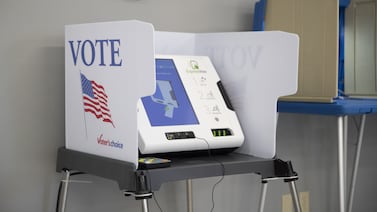A version of this post was originally distributed in Votebeat’s weekly newsletter. Sign up here.
Over a single bizarre week, we saw the convergence of some seemingly random events ultimately connected by one thing: The lingering shadow of former President Trump’s movement to delegitimize the 2020 election.
First, we had Trump acolyte Mike Lindell, of MyPillow fame, gathering fellow believers of Trump’s big lie in Sioux Falls, South Dakota, to present his long-touted, allegedly definitive evidence that the election had been hacked and fraudulently delivered to Joe Biden. The three-day “cyber symposium” concluded Thursday with Lindell’s attempt at a bombshell, which turned out to be a dud when he decided not to present the data to back up his claims. Instead, Lindell showed dramatic images of computer code on the screen and some unclear file structures that looked like a slide of wingding characters. Lindell’s own cyber expert acknowledged at the symposium that Lindell’s data doesn’t prove his claims. Even Lindell’s fans, many of whom had flown from across the country, were disappointed.
“I think the guy makes a wonderful pillow,” one attendee told CNN. “But I wish some of this information had been organized a little better.” Lindell also declined to turn his evidence over to CNN, for fear the news outlet may “doctor” the data. Maybe Lindell’s aborted presentation had more to do with a federal judge’s ruling this week that Dominion Voting Systems’ huge defamation lawsuit against Lindell could proceed in court.
Lindell’s spectacle was bookended by two more events that conspiracy theorists have eagerly awaited: the Tuesday test of a FEMA alert system that would supposedly trigger an aggressive, nationwide lockdown by President Biden (or other assorted far-fetched crises), and Friday’s purported reinstatement of Trump as president of the United States, according to QAnon. Neither phenomenon came to pass.
The online chatter about these events, however, led the Department of Homeland Security to issue a public safety warning, which raised anxiety levels — and security — ahead of the summer conference of the National Association of Secretaries of State in Des Moines, the year’s largest gathering of state-level election officials. The DHS’s warning was prompted by “an increasing but modest level of activity online by individuals calling for violence in response to unsubstantiated claims of fraud related to the 2020 election and the alleged ‘reinstatement’ of former President Trump.”
Knowing I’d be at the conference, one state official texted me a few days ago: “So like, I don’t plan on dying for voting machines anytime soon. How are you feeling?” Now that I’m here (shout-out to Iowa, by the way, Des Moines is lovely), it’s apparent the threat has passed, and the conference — with its hearings about business registration, panels on election security, and beers at the hotel bar — is carrying on as normal.
Election officials and administrators certainly have legit reason to be concerned. They have been besieged by this hostile political climate. I reported for ProPublica that the threats began last summer, with callers and emailers threatening to murder election workers or telling them to kill themselves. The menacing has only gotten worse. “The complaints, the threats, the abuse, the magnitude of the pressure — it’s too much,’’ one city clerk in Michigan told the Washington Post this week. “It used to be fun to be an election clerk,” another one said, “but it isn’t any more.”
The Department of Justice recently launched a task force to investigate the problem, but it might be too late. Dozens of officials with good reputations and years of experience have left the field, citing burnout. A recent survey showed that one-third of the country’s election administrators will be eligible for retirement before the 2024 election, and many might see retirement as a better alternative to getting threats.
Nonprofit groups have begun releasing reports on how to retain election officials. “Due in large part to the incendiary rhetoric from former President Donald Trump and his followers, many election officials were threatened and harassed, and such behavior shows no signs of abating,” wrote David Levine at the Alliance for Securing Democracy. “Considering what many of these election officials and their staffs endured during the 2020 election cycle, and continue to experience, it would be unwise to simply wait and hope that they decide to hang on.”
Meanwhile, the NASS conference is apparently sticking to a typical schedule that seems quaint by comparison. Outside of the many closed sessions, where high-level officials may be talking urgently but privately about America’s election emergency, there are sessions on notary publics and a virtual escape room (in which state officials can test their problem-solving skills in a fictional scenario involving Alexander Hamilton “battling it out in a fierce election in Dueling County.“) There is an IT roundtable, and a hall of vendors and nonprofits introducing themselves to state employees. On its face, the sheer normalcy of it — in 2021, in this unsettling week of August — is almost surreal.
Back Then
The general election of 1860 nearly tore the country apart and set the stage for the American Civil War. Abraham Lincoln, of course, was the Republican candidate. The Democratic Party put two candidates on the ticket, choosing both Southern Democrat John C. Breckinridge of Kentucky and Northern Democrat Stephen A. Douglas of Illinois. It was a real-world representation of the Democratic Party’s deeply diverging viewpoints, particularly on slavery. Both claimed to be the party’s official candidate. Lincoln — who was not even on the ballot in most Southern states — won no electoral votes from any state that would later form the Confederacy, with the exception of Virginia, where he won a single vote. By the time Lincoln was inaugurated in March, the South had seceded. A month later, the country was engaged in a full-blown war. After this election, the country settled into an established two-party system with a Democratic Party and a Republican Party.
In Other Voting News
- Wisconsin Gov. Tony Evers vetoed six Republican election bills this week, most of which added new restrictions to voting or conducting elections. One measure would have required voters who identify as “indefinitely confined” (usually due to age or illness) to submit a copy of their photo ID to vote by mail. Under another requirement, voters would have to complete two forms, instead of one, to apply for an absentee ballot. And one of the bills would have banned clerks from fixing simple mistakes on absentee ballot envelopes.
- In its second special session, the Texas Senate again passed the Republicans’ election bill, but not before Democratic Sen. Carol Alvarado delayed the vote by staging a 15-hour talking filibuster, from Wednesday evening into Thursday morning. The bill is again held up in the House due to lack of quorum because of the 52 Democrats who remain away from the Capitol—and now face warrants for their arrest.
- ABC News identifies nine states that have enacted laws transferring authority over election decision-making to partisan bodies, such as legislatures or state boards of elections. The most notable example is Georgia’s new law giving its Legislature the power to take over a county’s election administration. But there are lesser-known authority-shifting provisions in such states as Kentucky, Arizona, and Montana.
- The Colorado secretary of state has decertified a county’s election equipment after determining an unauthorized person accessed a software upgrade session and leaked passwords to online conspiracy theorists last week. Based on a preliminary investigation, Secretary Jena Griswold says Mesa County Clerk Tina Peters “allowed a security breach and, by all evidence at this point, assisted it.” When the news came out, Peters, a Republican, was in South Dakota attending Mike Lindell’s event.
- The Census Bureau handed over the data this week that very belatedly kicks off redistricting in most states. The sure-to-be-rushed process — which varies wildly from state to state but is often partisan-driven — will shape the results of many legislative and congressional elections in the 2022 midterms. The process will also ignite a long, fractious partisan conflict and a saga of lawsuits, especially without the preclearance protections of the Voting Rights Act that previously helped keep gerrymandering in check.
- Pennsylvania is one place where the process promises to be fascinating. Currently the state’s delegation to the U.S. House is split 9–9, but the state is losing a seat due to slow population growth. The Republican-controlled legislature will draw the new congressional districts, and Democratic Gov. Tom Wolf can veto the map if he thinks it unfairly advantages Republicans. If the two sides can’t agree on any map, the matter would fall to the Democratic-leaning state Supreme Court. Meanwhile, a bipartisan commission is charged with drawing state legislative maps—without the proposed guardrails that would have helped prevent gerrymandering.
- Meanwhile, in Michigan, where for the first time an Independent Citizens Redistricting Commission will draw the maps, population declines alone stand to shift the partisan balance of power across redrawn districts, especially in and around Detroit.
In Their Downtime
Our hobbyist feature is back in business! This week, I bring you the most adorable submission yet: Angie Cloutier, an elections database programmer in Yavapai County, Arizona. But we’re also featuring — and this will make more sense later — her Aunt Dibbie.
Since Angie and her husband bought their house in 2010, they have been going all out on holiday decorations, with a really admirable level of community energy.
“We started with Halloween and Christmas, then added other holidays like St. Patrick’s Day and July 4th as we went along,” she said. “To my surprise, my husband really wanted to help. So, I would come up with these elaborate themes and ideas, and he would use his technological and carpentry skills to make it happen.”
When Angie was young, her Aunt Dibbie would throw massive holiday parties for all of the kids in her family. She said that as a child of a single mother who didn’t want to make the holidays a big deal, she cherished those parties. “She would get dressed up, go all out decorating and making up games, and really make a big deal of it,” she said. “I think she liked the idea of giving us kids a sense of community.”
When Angie was 10 years old, her Aunt Dibbie passed away of diabetes complications. Angie’s passion for decorating is, in part, in honor of her.
Angie’s neighbors always enjoyed the decorations, but in 2020 the festivities garnered even more appreciation. People knocked on the door to tell them it had been the highlight of their day; one person left a sticky note of thanks.
“The outpouring of love and the happiness it causes others was just overwhelming,” she said. “That was when I knew I had to keep it going all year long. If this one small thing of decorating our home can bring joy to people year-round, especially during the pandemic, then we are all about it. I hope in some small way, we are creating a little bit of that sense of community my Aunt Dibbie instilled in us as kids.”
Last year, they faced the reality of a pandemic Halloween, they came up with a plan: She and her husband bought a “TON” of candy, and when October rolled around they set up a trick-or-treat drive-through and advertised it all month with a sign. Her kids put on masks and gloves and filled 200 bags with candy. They picked an Old West theme so that bandanas and gloves could be integrated into their costumes.
“People were so kind and thankful, and it made us happy to know that we could create a safe, Happy Halloween for neighborhood kids, the way my Aunt did when I was little.”






